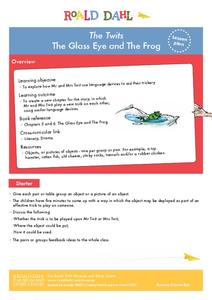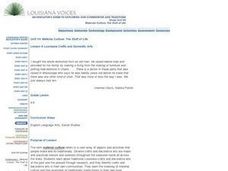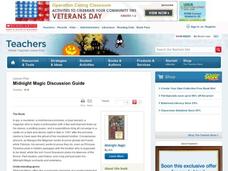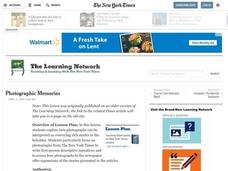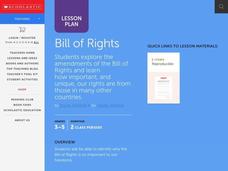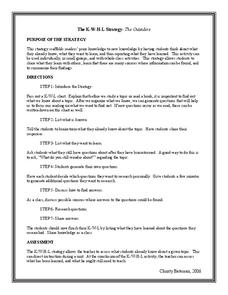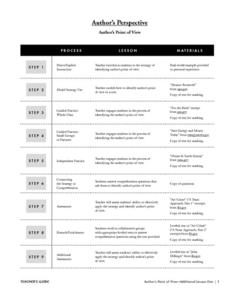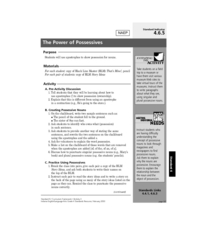Prestwick House
Teaching Shakespeare: Sonnet 73
It's that time of year to consider how Shakespeare selects his images and structures his Sonnet 73 to develop the meaning of the poem. Class members examine the rhyme scheme, the indented lines, the conceit, and the images used in each...
Curated OER
Rosencrantz and Guildenstern Are Dead: DR-TA Strategy
Making predictions is an excellent reading strategy. Work on building this into your pupils' toolkit of strategies by trying out the process outlined here for reading the very beginning of Rosencrantz and Guildenstern Are Dead. The...
Smithsonian Institution
Art to Zoo: Life in the Promised Land: African-American Migrants in Northern Cities, 1916-1940
This is a fantastic resource designed for learners to envision what it was like for the three million African-Americans who migrated to urban industrial centers of the northern United States between 1910 and 1940. After reading a...
Curated OER
Language Change: The Origins of Names
In small groups or pairs, learners explore the origins of each others' names. An awesome idea, but you'll need to do the initial research to gather your class's names and their origins. Or, consider having each member of your class...
Curated OER
Linguistic Diversity. Languages in Canada - Elementary
Create a language mosaic to reveal the linguistic diversity in your community. Pupils interview a person with a home language other than English and contribute to a bulletin board display representing the variety of languages spoken. The...
Curated OER
Are You Listening?
To underscore the importance of practicing good listening skills class members engage in a series of activities that model poor listening skills. In pairs and then as a whole group, class members enact different, more positive techniques...
Roald Dahl
The Twits - The Glass Eye and the Frog
What do a pair of stinky socks and a toy hamster have in common? The third lesson in an 11-part unit designed to accompany The Twits by Roald Dahl uses silly objects to teach about figurative language. Zany pranks and role play make...
Curated OER
Louisiana Crafts and Domestic Arts
Discuss with the class the reasons for identifying and defining the term material culture as refering to a vast array of objects and activities that people make and do traditionally. Your class can identify diverse crafts and decorative...
School Journalism
Investigative and Data Journalism – Day One
A free press, free to investigate and report on responsibly, compelling stories, is essential to a democracy. A 10-slide presentation details where to get ideas, how to go about an investigation, gather data, and assure the accuracy of...
Scholastic
Midnight Magic Discussion Guide
This discussion guide accompanies the fiction book Midnight Magic written by Avi, enforces story elements, inferences, and theme/plot. Have the class work on it over time, it will engage even your reluctant readers.
Curated OER
Photographic Memories
Explore how photographs can represent a whole story to a viewer. Middle schoolers work on narrative writing techniques in this lesson, focusing on photographs from the New York Times to write first-person descriptive narratives....
Curated OER
Bill of Rights
Students discuss the government as a whole and then each amendment is examined. They complete a Bill of Rights test in groups or on their own. Answers are gone over in class and discussion is encouraged.
Curated OER
Inferring Character Traits
Here is a lesson which is "flexible," and can operate as an individual or whole class activity. After reading a book of their choosing, with the use of a semantic map, learners identify character traits. They infer how their feelings...
Curated OER
Long Vowel Phoneme - ai
Kindergarteners identify the long vowel sound /ai/ in speech and writing. The whole class shares the book, Daisy the Snail, then brainstorms as many /ai/ words as they can. The class constructs a word wall with the /ai/ words.
Curated OER
The Adventures of Tom Sawyer: Anticipation Guide
Start off your study of The Adventures of Tom Sawyer with a lesson spent exploring some of the concepts that will be present in the novel. This anticipation guide focuses on honesty and lying. After learners decided if they agree or...
Curated OER
The Outsiders: The K-W-H-L Strategy
What does your class know about the 1960s? Introduce your unit on S.E. Hinton's The Outsiders with a K-W-H-L chart, which encourages kids to list what they already know about the time period, what they would like to know, how they...
Apple State University
Friendly Letter Mini-Lesson
This mini-lesson about informal letter writing is packed with a lot of information about writing a friendly letter. Class members begin by working in pairs to answer questions after reviewing letter models. Then, take part in a grand...
Take 10
Author’s Perspective
Gradually build understanding of author's point of view through a scaffolded set of exercises. Moving from direct instruction, to collaborative work, and eventually to independent practice, these steps will assist your class in...
Curated OER
Phonics: Decoding Words in Connected Text
Decoding words in connected text can make emergent readers really feel like they are great readers. They work as a class to sound out simple cvc words located in super short sentences. Tip: Extend this activity by having a variety of...
Curated OER
Vocabulary Strategy: Call of the Wild
Here is a strategy for groups to contribute to whole class vocabulary development. Teams (based on seating rows) work together to look up dictionary definitions of words from upcoming sections of the book (though previous sections seem...
Curated OER
Speak a Little Clearer!
What are the characteristics of effective public speaking? Emerging orators choose a fairy tale to present orally to the class. After modeling yourself, divide the class into small groups, having them critique each others' oral...
Curated OER
Friday Forum (Day 4)
Have your young speakers participate in a discussion/debate with their whole class on their prepared argument. They listen and analyze other student's arguments and refute arguments using logic and not emotion.
Curated OER
Reintroduce /au/
Practice decoding au words with your first and second graders. They state the sound of au when the teacher points to the corresponding letter combination, and remain silent when any other letter combination is displayed. Complete...
Curated OER
The Power Of Possessives
The whole class with get when to use an apostrophe after this activity. They use apostrophes to show possession or ownership. This activity includes a discussion starter, a practice exercise, a story activity, and a practice...






